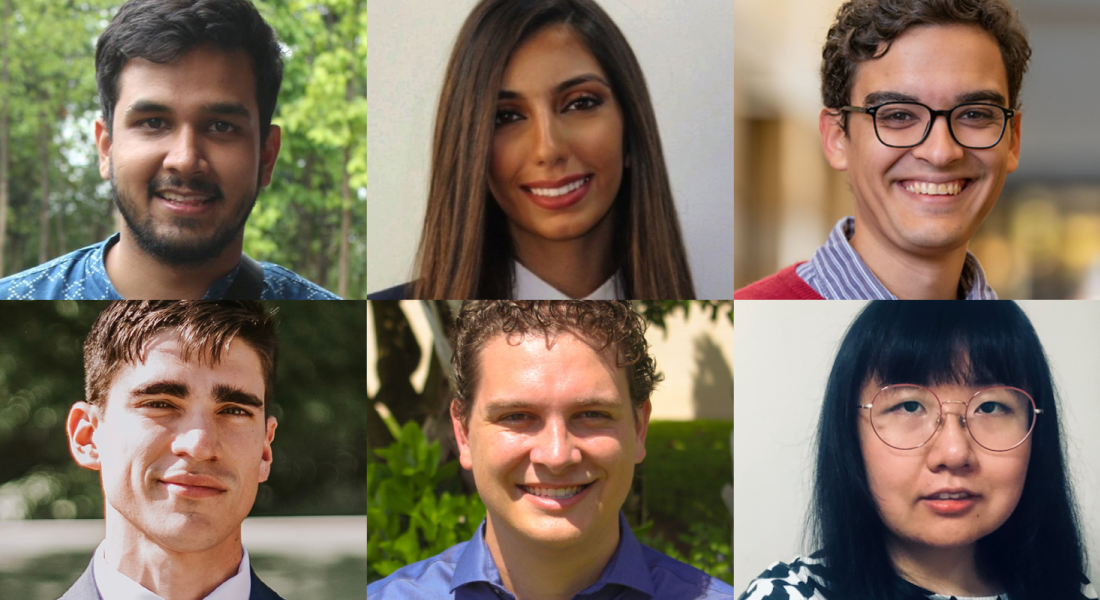
In fall 2022, the Kellogg Institute for International Studies welcomed six new PhD Fellows to its ranks of Doctoral Student Affiliates. This year’s recipients will bring to the Kellogg scholarly community over the coming years a diversity of perspectives from their various disciplines and their distinct backgrounds.
-
Anivesh Bharadwaj is a JSD student who holds an LLM in international criminal law from a joint program between Columbia Law School and the University of Amsterdam. While earning this degree, he worked as a research assistant at Columbia on a project analyzing the right to equality in South Asian countries. Most recently he was a visiting professional at the Trial Chambers of the International Criminal Court and a visiting scholar at Columbia Law School. He also worked with a criminal appeals firm in California, assisting members of marginalized communities on issues surrounding the right to a fair trial.
-
A native of Lebanon, Perla Khattar is also pursuing a JSD in human rights. A first generation attorney, she was awarded a Fulbright Scholarship after graduating as valedictorian from La Sagesse University, Beirut. She was also valedictorian as she graduated from Loyola University in New Orleans with a masters of law. Khattar has published journal articles in the fields of privacy, technology, financial markets, and human rights. She has served on the executive board of the NGO Proud Lebanon, where she wrote the section related to the right of LGBTIQ+ individuals in Lebanon's third round of the Universal Periodic Review (UPR) to the United Nations. She also ran a nationwide campaign to decriminalize same-sex relationships in the country.
-
Brazilian Pedro Pontes is a sociology PhD student interested in the production of knowledge by modern nation-states, and, more specifically, the way they are able to produce legibility about citizens. He is also interested in the politics of knowledge production, and how differences in legibility schemes translate into inequalities in policy output. Before coming to Notre Dame, Pedro worked as a researcher at the Instituto de Pesquisa Econômica Aplicada, a public institution in Brazil dedicated to analysis of policy issues. He holds a master’s degree in sociology from the Universidade Federal do Rio de Janeiro (Brazil)
-
Originally from Santander, Colombia, Juan Vargas Hernandez is pursuing a PhD in the Department of History. He studies indigenous and Black royalism during Colombia’s independence process, focusing on understanding the reasons to fight against the republic, and the lasting consequences faced by inhabitants of royalist bastions through the consolidation of the Republic. “The exclusion of these territories from the national foundational myth contributed to abandonment and neglectfulness through the 19th century,” he states, “and I hope my work will help explain this phenomenon.” He holds a bachelor degree in history from Hillsdale College, Michigan.
-
Coleson Weir is a PhD student in economics whose research agenda examines the relationship between political institutions, health, and education in developing countries. Before coming to Notre Dame, Coleson earned an MS in economics and applied econometrics and an Honors BS in mathematics and economics from the University of Delaware. His master’s research examined the effect of banning female genital mutilation on the educational attainment level of girls. As an undergraduate, he was a research assistant in the Department of Mathematical Sciences researching an application of probability theory in combinatorics.
- Phoebe Zhou is pursuing a doctorate in the Department of Anthropology. She previously studied medical anthropology at the University of Edinburgh, where she wrote an MSc thesis about depression in China. She also holds an MPhil and a BA from the University of Hong Kong. Her PhD research will build on her MSc thesis, investigating the (bio)politics and subjectivities of depression in China. She is interested in looking at how the country's mental health landscape evolves under post-socialist transformations and is becoming a critical domain where governance and interiorities are negotiated or contested.
Kellogg PhD Fellowships are competitive awards, bestowed before students decide to come to the University of Notre Dame as an incentive to attract outstanding students in a variety of disciplines who are committed to the study and understanding of global issues. Recipients receive $6,000 per year to supplement their departmental stipends, renewable annually for four additional academic years.





